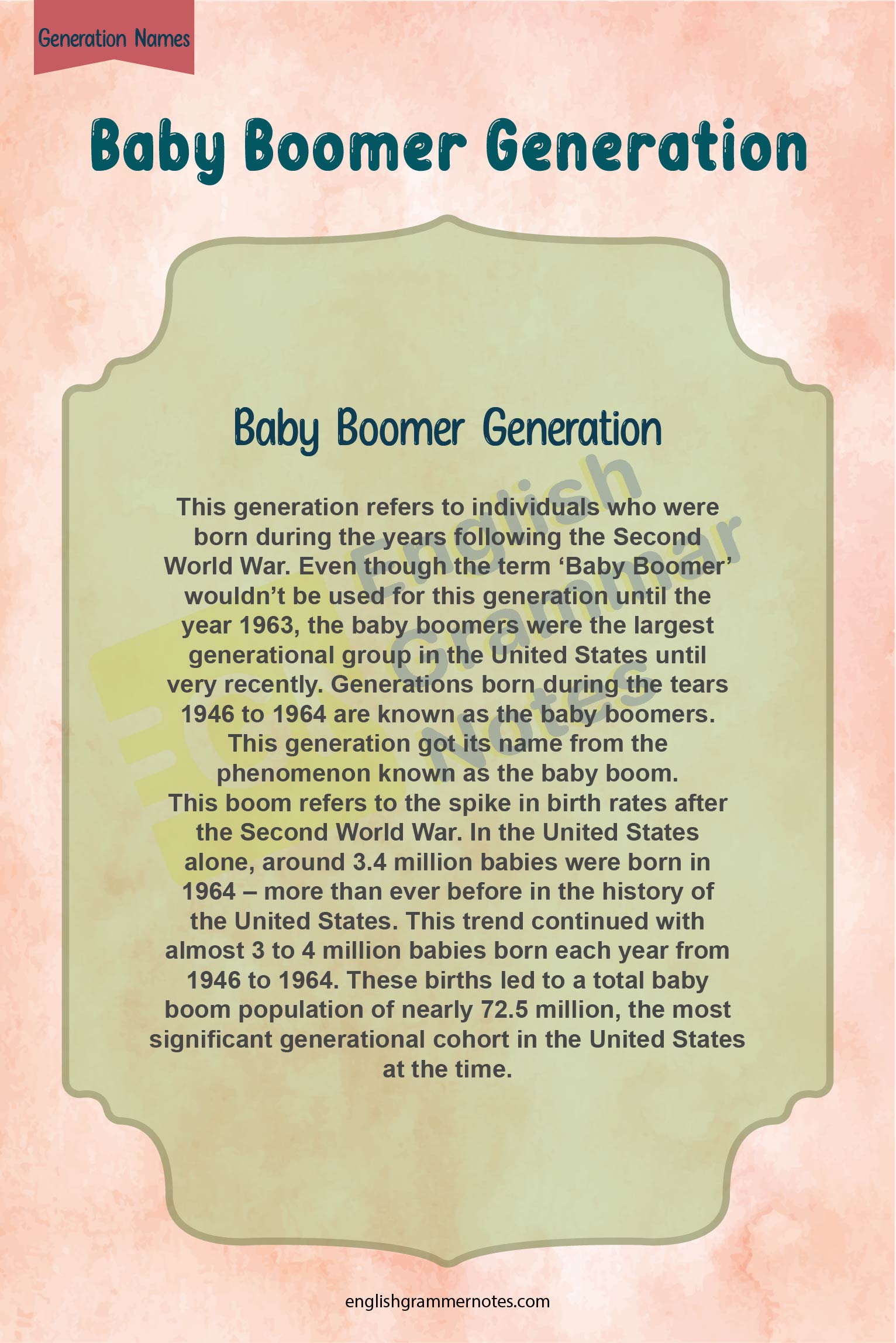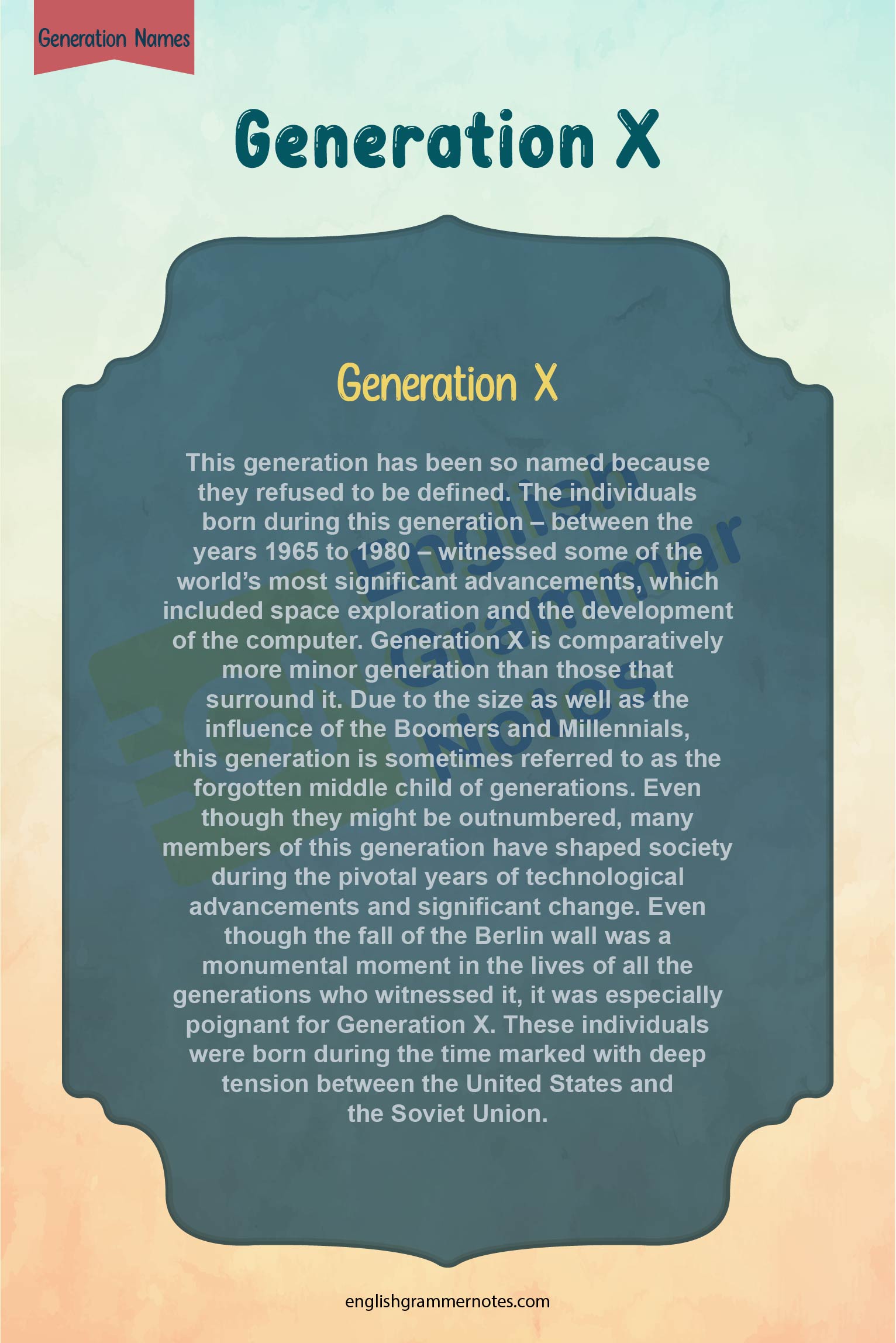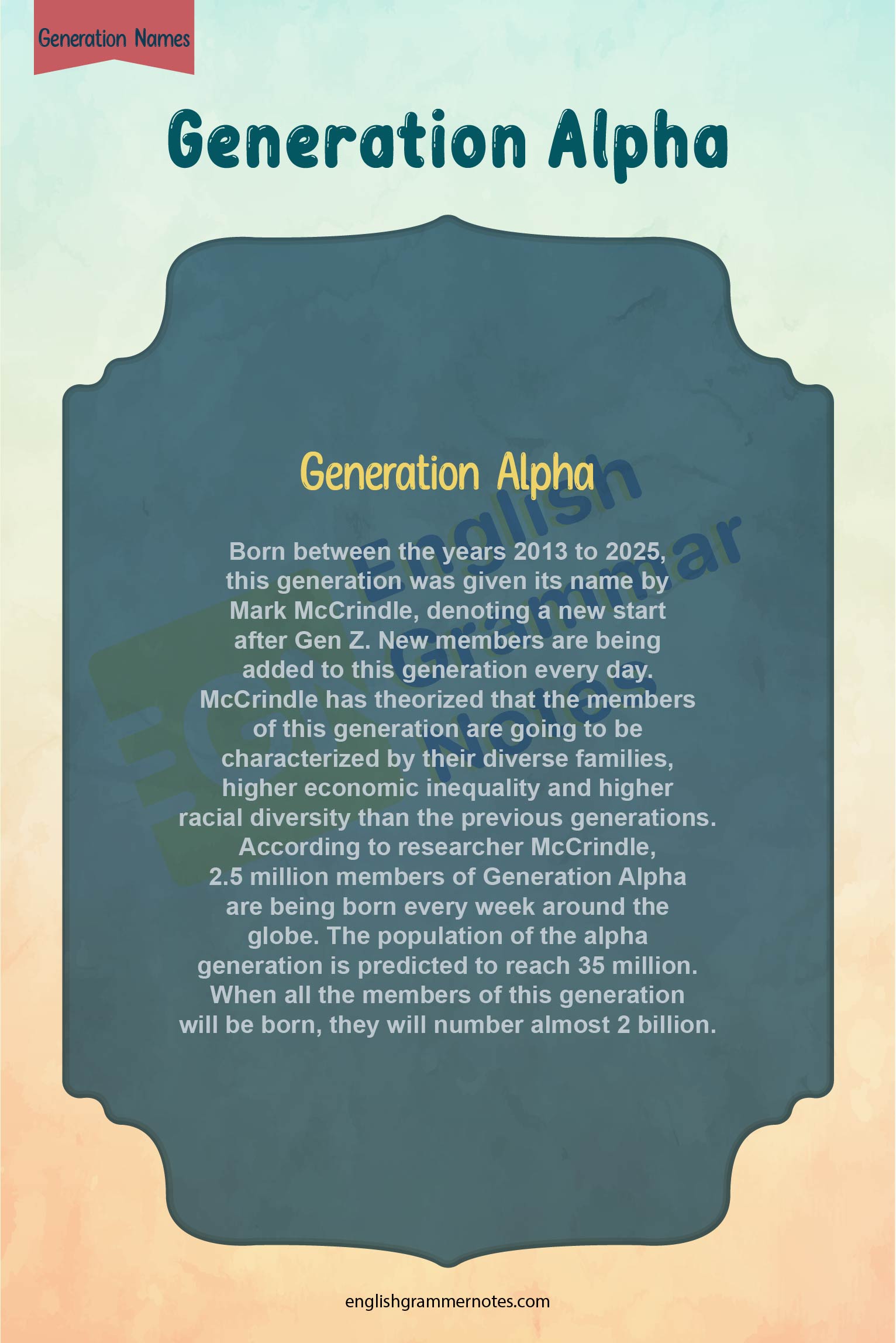Generation Names: A ‘generation’ can be identified by a group of people born during the same period, and generation names exemplify the tendencies of humans to categorize them. Over time, scientists, generation researchers and sociologists generally deem titles for the different age groups based on historical, social trends.
We have developed a list of generic names that will help you better understand the different generations and their characteristics. Understanding each generation’s trends and quirks allows us to communicate and relate with people who came before us and are from other age groups.
Study the most important English Vocabulary Words identified by our experts and learn the right vocabulary to use in your day to day conversations
List of Generation Names
Names of Generations
- The Lost Generation
- The Greatest Generation
- The Silent Generation
- Baby Boomer Generation
- Generation X
- Generation Y
- Generation Z
- Generation Alpha
Fascinating facts about the generation names on the list
The Lost Generation
The Lost Generation – name given by author Gertrude Stein – refers to people born from 1883 to 1900. In Europe, this generation is known as the ‘generation of 1914’ and in France as ‘fire or flame generation’. During the First World War, these individuals came to age, witnessing an imaginable loss of lives and mass immigration.
This generation also designates a group of writers, American artists, and philanthropists who lived and worked in Paris during the interwar period. These individuals have been deeply marked by the devastating effects of World War I. Various new combat methods with planes, tanks and machine guns have taken down an entire generation of young people, profoundly traumatizing the survivors.
Learning to live once again, these individuals rebelled against the values of their parents – sceptical of any authority and cynical for the future of humanity. They brought down the progressive, materialistic and patriotic ideology, seeking lightness and hedonism.
Having lost hope and faith in modern society, these individuals experienced a shallow, life aimless, self-indulged, focused on frivolity, longing for an idealized past. In the wake of the industrial revolution, the western members of the lost generation grew up in societies that were more consumerist, literate and media-saturated than ever before.
The individuals of the lost generation were also highly vulnerable to the pandemic of Spanish flu and the driving force behind several of these cultural changes, which took place in large cities in specific during what became known as the roaring twenties. Later, this generation also experienced the economic effects of the Great Depression and usually saw their sons leave for the battlefields of the Second World War.

The Greatest Generation
The Greatest Generation relates to the generation of the United States that came of age during the Great Depression and later fought in World War II. These individuals were born during the years 1901 to 1924. Their parents were most likely to be a part of the Lost Generation.
This generation got its name from the book by the same name written by Tom Brokaw, a journalist from NBC. In his book, the writer explores the characteristics and stories of this generation. The book expresses the belief that the age is the greatest ever produced by society. Specifically, the writer admired this generations desire to do the right thing.
This generation’s childhood was marked by economic success and technological advancements such as the telephone and radio. This success was in contrast with their later years, which were marked by economic turmoil when the Great Depression occurred due to the 1929 stock market crash.
The Great Depression roughly lasted a decade which resulted in a 25 per cent rate of unemployment.
Due to the wake of Pearl Harbor, millions of men enlisted themselves to defend and fight for their country. During the absence, the women rose to the occasion of supporting their families and their country by working in factories and many other places.
Everyone who was involved in this is still remembered for their sacrifice and bravery. After facing the struggles of war and a struggling economy, the veterans who came back home helped rebuild the communities and the economy.
The economic turmoil because of the Great Depression had profoundly affected this generation, leaving the individuals with the desire of ending poverty and creating economic opportunities. As a result of this drive, the generation is recognized for their success in the later years.
As a result of the Great Depression and the Second World War, this generation had developed remarkable resilience in surviving hardships and solving problems.
The Silent Generation
This generation was first documented in a 1951 article, claiming that the most significant fact was its silence. The ‘silent’ behaviour of this generation has been attributed to the difficult times during which they were born – as well as coming to age during McCarthyism.
Even though the Silent Generation is known for their traditionalist behaviour and the desire to work within the system rather than to change it. Several not-so-silent and untraditional members of the generation shaped the world in many ways. The individuals born in a generation were usually born during the years 1901 to 1924.
These years from the beginning of the Great Depression to the end of the Second World War. Individuals born during this time are also sometimes known as ‘Radio Babies’ and ‘Traditionalists’. The term ‘Silent Generation’ primarily refers to the individuals living in the United States, but in other parts of the planet, economic and war trouble led to similar behaviours and characteristics in people born during this time.
This generation began life in some of the most challenging situations, including the Dust Bowl, the Great Depression, and political and economic uncertainty. The circumstance surrounding the upbringing of these individuals led many of this generation for adopting conscientious, cautious behaviour. They also have the characteristics such as respectful, thrifty, determined and loyal.
Baby Boomer Generation
This generation refers to individuals who were born during the years following the Second World War. Even though the term ‘Baby Boomer’ wouldn’t be used for this generation until the year 1963, the baby boomers were the largest generational group in the United States until very recently.
Generations born during the tears 1946 to 1964 are known as the baby boomers. This generation got its name from the phenomenon known as the baby boom. This boom refers to the spike in birth rates after the Second World War.
In the United States alone, around 3.4 million babies were born in 1964 – more than ever before in the history of the United States. This trend continued with almost 3 to 4 million babies born each year from 1946 to 1964. These births led to a total baby boom population of nearly 72.5 million, the most significant generational cohort in the United States at the time.
This rapid rise in the birth rate is attributed to several causes. In some cases, those who wanted to have families waited until after the war to have children. By this time, the economic turmoil of the Great Depression and the war was finally subsiding. Soldiers returned home, ready to start families, hoping to provide a better life for their children.
Even though it is difficult to describe an entire generation accurately, however, some general characteristics of baby boomers are they are goal centric, value relationship, resourceful, and purpose centric.

Generation X
This generation has been so named because they refused to be defined. The individuals born during this generation – between the years 1965 to 1980 – witnessed some of the world’s most significant advancements, which included space exploration and the development of the computer.
Generation X is s comparatively more minor generation than those that surround it. Due to the size as well as the influence of the Boomers and Millennials, this generation is sometimes referred to as the forgotten middle child of generations. Even though they might be outnumbered, many members of this generation have shaped society during the pivotal years of technological advancements and significant change.
Even though the fall of the Berlin wall was a monumental moment in the lives of all the generations who witnessed it, it was especially poignant for Generation X. These individuals were born during the time marked with deep tension between the United States and the Soviet Union.
Gen Xers were also the first generation to grow up after the civil rights movement. Many individuals in this generation grew up with the ideas of diversity and equality and didn’t remember a time prior to the civil rights movement. The individuals of this generation also grew up with the very first personal computer. During their youth, the members of this generation witnessed the use of personal home computers for the first time.

Generation Y
This demographic is more widely known as the ‘Millennials’ since they became adults at the turn of the millennium. It refers to the individuals who were born during the last two decades of the 20th century – between the years 1981 to 1996.
It was during the childhood and teenage years of the millennials that technological advancements revolutionized the world that we live in. Think of all the many life aspects being affected or controlled by the internet – the millennials came to age at the same time all these technological changes were happening.
Even though it is difficult to characterize an entire generation, scientists and sociologists have listed some quirks and characteristics they have noticed in the members of this generation. They are good at accepting change. They are curious beings and understand the value of teamwork.
Most millennials remember the 9/11 terrorist attacks. It has left a massive mark on these individuals and affected the lives of many individuals. Most millennials were either teenagers or young adults when the first social media platform were available – technologies that completely turned around the way people communicated or interacted with each other around the world.
Millennials entered the 2008 economic recession shortly after college or some even during college. Many members of this generation had lost their jobs because of this crisis or were forced to change or study a different career.
Generation Z
Generation Z, also referred to as Gen Z, relates to the individuals born between the years 1997 to 2012 following the millennials. This generation has been raised on the internet and various social media platforms.
The Generation Z is the youngest, most ethnically diverse, widely accepting and largest generation in the history of America alone, comprising 27% of the US population. These individuals are often stereotyped to be tech-addicted, anti-social or ‘social justice warriors’ since they are known to live their lives off of the internet.
Generation Z is considered to be more accepting and open-minded than any other generation prior to it. Almost half of the Gen Zs are minorities, compared to 22% of the Baby Boomers. The majority of this generation support various social movements such as transgender rights, Black lives matter and feminism.
The members of the generation are highly educated and make promising entrepreneurs. This generation is also more familiar with the no-heteronormative identities than the previous generations.
With the worsening of the climate crisis, the advent of social media and the rise in the shooting of the masses, among many other socio-political pressures, the zoomers are the most depressed generation but also the ones most likely to engage in social activism.
This is the generation that came to age during the outbreak of the Corona Virus. The people of this generation are also referred to as the zoomers. They have limited memory and experience about the world prior to the internet – the time before Google Maps, Facebook, Instagram or even smart phones. Zoomers have the privilege of communicating with almost anyone, anywhere around the globe.
Generation Alpha
Born between the years 2013 to 2025, this generation was given its name by Mark McCrindle, denoting a new start after Gen Z. New members are being added to this generation every day. McCrindle has theorized that the members of this generation are going to be characterized by their diverse families, higher economic inequality and higher racial diversity than the previous generations.
According to researcher McCrindle, 2.5 million members of Generation Alpha are being born every week around the globe. The population of the alpha generation is predicted to reach 35 million. When all the members of this generation will be born, they will number almost 2 billion.
